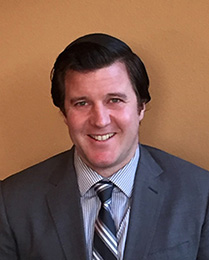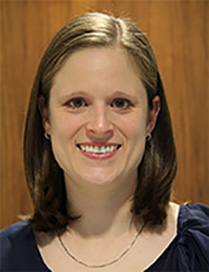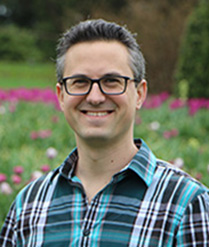Biomedical engineering welcomes three new faculty members
6/29/2017
UNIVERSITY PARK, Pa. — The Department of Biomedical Engineering will welcome three new faculty members during the fall 2017 semester.
“We are thrilled to be adding three remarkably talented individuals to biomedical engineering who will bring new knowledge and interdisciplinary research strengths to the department continuous expansion and opportunities to student learning,” said Cheng Dong, department head of biomedical engineering.
Justin Pritchard, Meghan Vidt, and Spencer Szczesny will all join as assistant professors in biomedical engineering as their primary tenure home.
Pritchard will arrive from Boston, Massachusetts where he completed a doctorate in computational and systems biology at Massachusetts Institute of Technology (MIT). Pritchard received a Bachelor of Science from the Univeristy of California, Los Angeles majoring in Biology and minoring in Mathematics. After MIT, Pritchard did a postdoctoral fellowship at Harvard, and then began his career at ARIAD Pharmaceuticals. Pritchard has over 10 years of experience in academia and industry studying and fighting drug resistance.
At ARIAD Pharmaceuticals, Pritchard led an interdisciplinary group that integrates genomic and clinical data mining with cell engineering. “Justin’s distinct background in academia and industry has prepared him to tackle important questions in drug resistance by using genomic, protein/cell engineering, and systems modeling approaches, which will be one of those important areas that Penn State biomedical engineering and the Huck Institute aim to advance,” said Dong.
Pritchard’s Penn State lab will focus on the evolution of drug resistance. It will combine quantitative and experimental approaches from systems/synthetic biology and data science to fight drug resistance.
Pritchard will also hold a joint appointment in the Huck Institutes of the Life Sciences.
Vidt worked for Arizona State University and received her undergraduate degree in biomedical engineering from North Carolina State University. Her doctorate in biomedical engineering was completed at Wake Forest University in the Virginia Tech at the Wake Forest School of Biomedical Engineering and Sciences. Vidt's graduate research examined the biomechanical and morphological effects of a rotator cuff tear in older adults and was funded by a National Institute of Health (NIH) F31 Fellowship from the National Institute on Aging (NIA). Her postdoctoral research was performed at the University of Waterloo and focused on the biomechanics of the shoulder complex in the context of ergonomics.
At Penn State, Vidt’s research will focus on musculoskeletal biomechanics of the upper extremity where she will lead the Movement of the Upper Limb and Shoulder Laboratory (MUSL). This research employs a comprehensive approach to assess upper limb mobility and function in various populations, including aging, and musculoskeletal injury. This work is accomplished through the application of experimental, computational, and medical imaging techniques. The ultimate goal of this research is to identify the underlying mechanisms contributing to functional deficits and development of subsequent pathology. Working with the Hershey Medical Center, outcomes of this research will guide development of targeted treatment strategies to return patients to pre-injury levels of function.
Vidt will also serve as a joint faculty in the Department of Physical Medicine and Rehabilitation (College of Medicine).
Szczesny is coming from the University of Pennsylvania, where he conducted his postdoctoral research and obtained a doctorate in bioengineering. His work investigated the multiscale mechanics of tendon fascicles and the role of mechanobiology in tendon degeneration. Prior to his doctorate, Szczesny developed medical implants as a design engineer for Aesculap Implant Systems and as a research assistant at the Helmholtz Institute for Biomedical Technology in Aachen, Germany. He obtained a Master of Science in mechanical engineering at the Massachusetts Institute of Technology in 2005 and a Bachelor of Science in mechanical engineering at the University of Pennsylvania in 2003. In recognition of his contribution to the field of soft tissue biomechanics, Szczesny received an F32 Postdoctoral Fellowship from the NIH/NIAMS as well as numerous awards from the American Society of Mechanical Engineers (ASME) and the Orthopedic Research Society (ORS).
Szczesny’s research examines how cells in tendon sense the mechanics of their local microenvironment (e.g., strains, stiffness) and how their response drives changes in tissue mechanical properties during tendon degeneration, repair, and development. The ultimate goals of this work are to identify the causes of tendon pathology, discover novel therapeutic options, and direct the design of biomaterials that can recapitulate the behavior of native tissue. Furthermore, his research will produce fundamental knowledge regarding the feedback loop between local tissue mechanics and cellular mechanobiology, which is an important contributor to numerous diseases outside orthopedics, including tissue fibrosis and cancer.
Szczesny also has a dual appointment with the Department of Orthopedics and Rehabilitation and will lead the Multiscale Biomechanics and Mechanobiology Laboratory.
MEDIA CONTACT:
Jane Horetsky
jeh94@engr.psu.edu



 Meghan Vidt, assitant professor of biomedical engineering.
Meghan Vidt, assitant professor of biomedical engineering. Spencer Szczesny, assistant professor of biomedical engineering.
Spencer Szczesny, assistant professor of biomedical engineering.
